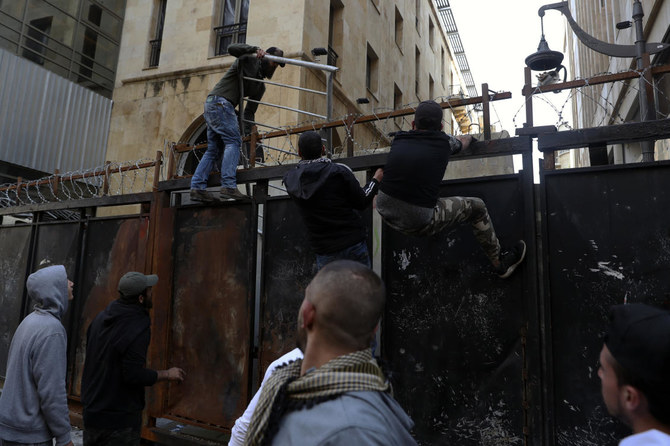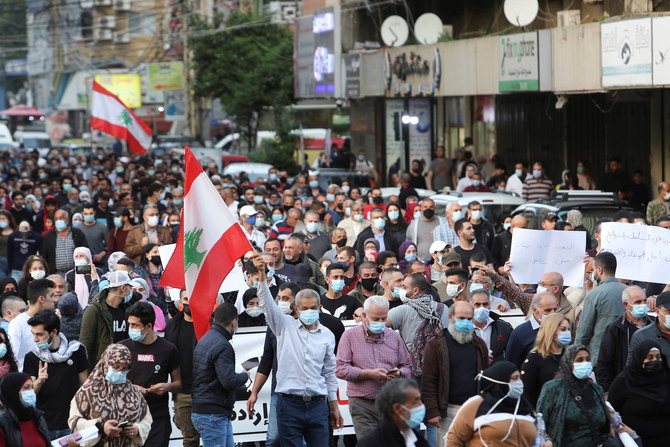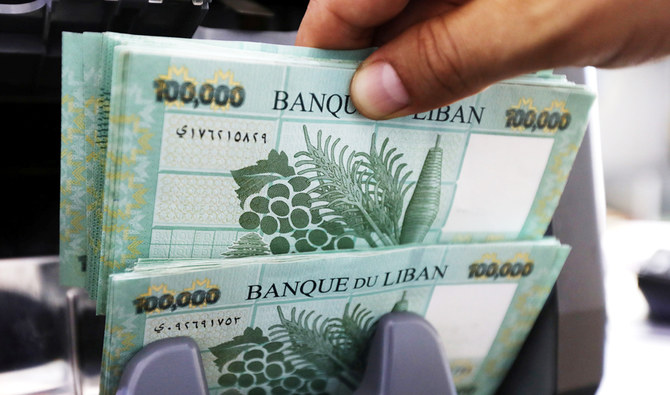by english.alaraby.co.uk — France and the United States hit out at Lebanon’s warring politicians on Thursday, with Paris saying they were failing to help the country as it slid towards “total collapse”. “It’s tempting to say it is a case of non-assistance to a country in danger by Lebanese politicians,” French Foreign Minister Jean-Yves Le […]

By NAJIA HOUSSARI – Arabnews.com — BEIRUT: Lebanese supermarkets halted sales and businesses closed their doors on Saturday as the country’s embattled currency slumped to a record low on the black market. With the dollar exchange rate exceeding 12,000 Lebanese pounds, panic erupted on the streets as shopkeepers and major outlets stopped selling goods to avoid incurring losses. Amid growing alarm at the country’s increasingly precarious state, activists in working-class areas in Mount Lebanon climbed the minarets of mosques and called on people to take to the streets. A spokesperson for the Oct. 17 revolution said: “We will stay in the squares until the corrupt system falls.” Hundreds of protesters in Martyrs’ Square in downtown Beirut pounded on metal barriers blocking access to parliament and hurled rocks at security forces manning roadblocks. Anti-riot personnel launched tear-gas grenades after violent clashes erupted between protesters and security forces.
In the past three days, Lebanon’s currency has endured a roller-coaster ride, rising to 9,000 Lebanese pounds against the dollar before falling to 10,000 Lebanese pounds. But in a dramatic collapse on Saturday, the Lebanese pound fell from 11,750 to 12,200 against the dollar, with the slump worsening by the hour despite efforts to close online trading platforms. Economist Louis Hobeika told Arab News: “The strong demand for the dollar is caused by the decline in confidence in the country. People are panicking about the future.” Hobeika rejected the idea that banks are buying up dollars. “The dollar trading volume in the Lebanese market does not exceed $2.5 million. The banks want to increase their capital on the request of the Banque du Liban collectively and need $3.5 billion — and this cannot be secured from the Lebanese market.” Protesters traveled to Martyrs’ Square from different regions, with retired soldiers leading many groups.
by arabnews — LONDON: A video of a Lebanese public policy consultant and activist ripping apart the government during a TV debate went viral on social media platforms Thursday, with many lebanese sharing it as a way to express their mounting frustration with the current situation in their country. Sara El-Yafi was highlighting the severity […]

BEIRUT (AP) By Bassem Mroue— Lebanon’s parliament on Friday approved a $246 million loan from the World Bank that would provide cash assistance for more than 160,000 families in the small country hit by an unprecedented economic crisis and the coronavirus pandemic. The approval came as the local currency hit a new record low on the black market, trading 11,150 Lebanese pounds to the dollar. The new crash triggered immediate protests, mostly in the country’s north. The previous day, France warned that Lebanon was running out of time before total collapse, blaming bickering politicians who for months have been unable to agree on a new government even as Lebanon slides into economic and financial abyss. Last week, protesters closed roads around the country with burning tires for a week, after the dollar hit 10,000 pounds on the black market for the first time. The currency collapse throws more people into poverty as their purchase power declines.
The currency crash will affect recipients of the cash from the World Bank, as the money will be distributed to the 161,257 families — or about 800,000 people — in Lebanese pounds. Each of the families will get 800,000 pounds a month for one year, according to the agreement with the World Bank that calculated the dollar at 6,240 pounds. Since Lebanon’s economic and financial crisis began in late 2019, there have been different exchange rates for the dollar in the highly-indebted country, including the official rate with about 1,500 pounds to the dollar, the black market rate, and a cash withdrawal rate from U.S. dollar accounts in local banks, with at 3,900 pounds for $1. Using the rate of 6,240 pounds to the dollar in helping poor families means they are being short-changed, getting about 62% of what they would be getting on the black market rate.
by reuters — French Foreign Minister Jean-Yves Le Drian said on Thursday time was running out to prevent Lebanon from collapsing and that he could see no sign that the country’s rival politicians were doing what they could to save it. “I would be tempted to qualify Lebanese politicians as guilty of not helping a […]
![Atallah works at the American University of Beirut Hospital and hosts a weekly podcast [File: YouTube/Screengrab]](https://www.aljazeera.com/wp-content/uploads/2021/03/Capture-2.jpg?resize=770%2C513)
by reuters — Sexologist Sandrine Atallah thought she had been asked on TV to debate sex education in Lebanon – instead, she was ridiculed by her male hosts, unleashing a firestorm about misogyny in the Middle East. In a country where sex education is all but absent from schooling and discussions on sex remain taboo, Atallah hoped to bring facts to the table and dispel disinformation. But even before she went on air, a panel of mostly male hosts tore into educational videos she had posted online, including one about arousal and another on masturbation. “Sometimes it’s sexual education, sometimes it’s sexy, I don’t know,” laughed one male host of On Another Planet. “The way she is talking is very arousing … your mind goes somewhere else,” said another of the show’s male presenters.
When the 42-year-old doctor entered the studio on Sunday, she was repeatedly interrupted and mocked, sparking outrage online about the objectification of women in a country with a long history of systemic sexism. Lebanese women are barred from passing citizenship to their children and personal status laws administered by religious courts favour men in matters from divorce to child custody. Though the country strengthened its domestic violence law and criminalised sexual harassment in December, Human Rights Watch said the law placed an overly high burden of proof on victims and failed to prioritise prevention. After widespread public pressure, the host of On Another Planet, Pierre Rabbat, apologised for “what happened on Sunday” – the second time in a week that Atallah was mocked on air. On Twitter, users decried the ridicule and lascivious hosting in a torrent of comments. “Pls don’t have kids and if you have a wife, I feel so bad for her,” Twitter user Marianne commented after the apology.

by arabnews.com — NAJIA HOUSSARI —BEIRUT: Lebanese troops on Wednesday reopened scores of roads closed by protesters across the country in the six past days amid anger at government inaction over the deteriorating economy. Road closures slowed the national vaccination plan, stopped trucks transporting oxygen to hospitals across Lebanon, and resulted in the two deaths of two men when their car hit a truck blocking a highway. Troops and security forces stepped in on Wednesday to prevent protesters in Hay Al-Sellom, a densely populated neighborhood in the south Beirut Dahye suburbs, from blocking roads with burning tires. The army said that “as a result of the tragic accidents and violations that took place and in order to preserve the safety of citizens, army units this morning began to open closed roads.”
On Monday night, a car struck a truck blocking a highway north of Lebanon, killing both occupants instantly. Protests also slowed the national vaccination rollout, which is still in its first phase, targeting the elderly and medical staff. Fewer than 4,500 people had received the first dose of the vaccine on Tuesday, according to the health ministry, as access to vaccination centers was blocked. Sharaf Abou Sharaf, head of the doctors’ syndicate, warned of “a rise in COVID-19 cases in the coming days since precautionary measures are not being fully followed.” Access of oxygen supplies to hospitals, filled with coronavirus patients, was also hit by the protests. Firas Abiad, director of the Rafik Hariri University Hospital in Beirut, complained about an alarming decrease in oxygen reserves due to the closed roads. “Without oxygen, we will be losing lives,” he said. Abiad also predicted a rise in the number of cases, saying: “Tough times are ahead.”

by Reuters/Beirut – Discontent is brewing in the ranks of Lebanon’s security forces over a currency crash wiping out most of the value of their salaries as unrest and crime surge. In unusually outspoken comments, army chief General Joseph Aoun said his warnings that the pressure on soldiers’ earnings and morale could lead to an “implosion” had fallen on deaf ears. Lebanon’s pound has crashed 85% since late 2019 in a financial meltdown that poses the biggest threat to stability since the 1975-1990 civil war. “Soldiers are going hungry like the people,” he said on Monday, berating politicians without naming names. “Do they want the army or not? Do you want the army to stay on its feet or not? … They don’t care.” The basic monthly salary of a soldier or policeman, which used to amount to around $800, is worth under $120 today. Budget cuts pushed the military to cut meat from its meals last year.
In what was seen as a sign of the times, the French embassy donated food parcels last month to the Lebanese army, which has long been backed by Western nations. Some officials caution that security forces will struggle to contain unrest. More than half the population is now poor, with wages slashed across the board, prices soaring and no state rescue plan in sight. That was even before the currency hit a record low last week after months of political paralysis. The military, its commander and the caretaker interior minister have denied recent local media reports that economic hardship spurred a rise in forces abandoning duty. Still, three security sources told Reuters a buildup of pressure on lower-ranking servicemen has fuelled concerns of desertions. One member of the security forces, speaking on condition of anonymity, said he wanted to leave after many years because it had become hard to pay rent. He said he knew three others who had deserted, which is punishable by law, and worried commanders would reject his request for a discharge.



BEIRUT: Lebanese protesters blocked key roads with burning barricades Monday in rage at the country’s political paralysis and deep economic crisis, after its currency hit record lows on the black market. The country is in the grips of its worst economic crisis in decades, compounded by the coronavirus pandemic. Prices have soared and more than half of the population is living below the poverty line, but the divided political class has for more than six months been unable to form a cabinet. Black smoke billowed up from overturned rubbish dumpsters and tyres set ablaze by protesters at various entrances to Beirut from early morning as part of a mobilisation they dubbed a “day of rage”.
“We’ve closed off all the roads today to tell everyone: It’s over, we have nothing left to lose,” said Pascale Nohra, a protester blocking the northern road into Beirut. “We’ve even lost our dignity.” She said it was time to revive the mass cross-sectarian protests of late 2019 against an entrenched political class, that has dominated the country since the 1975-1990 civil war. “We want everybody to show solidarity,” said the former real estate worker. “We need to return to the streets and revive our revolution.” Similar protests were held Monday in the northern port city of Tripoli. Lebanon’s currency has lost more than 80 percent of its value since the autumn of 2019, plunging to an all-time low of nearly 11,000 pounds to the greenback. In a country that imports most of its food, state subsidies have until now helped to partially stem the inflation.
Lebanon’s President Michel Aoun ordered the army and security forces to clear the roads but was set back by the army chief’s warning that soldiers would not be eager to exert the call — as they have been suffering from the country’s political stalemate just as its citizens, news agency Reuters reported. “The officer also is suffering and is hungry, to the officials I say, where are you going? What are you waiting for? What are you planning to do?” army chief General Joseph Aoun said in a statement, urging politicians to find long term solutions to lift Lebanon from its ongoing financial crisis.

by arabnews.com — NAJIA HOUSSARI — BEIRUT: Lebanese authorities have ordered a crackdown on illicit foreign currency speculation as protests continue in Beirut. The Attorney General Judge Ghassan Oweidat directed the Lebanese security services, including the Military Intelligence, the Internal Security Forces, the General Security, the State Security and the customs officials, to pursue money-changers who tamper with the national currency and are involved in illicit foreign currency speculation. This move, not the first of its kind, is an attempt to dampen the widespread indignation that has continued for six days and intensified in street protests on Saturday and Sunday, which broke out after the dollar exchange rate hit 11,000 Lebanese pounds.
The protesters set up road blocks with rocks and burning tires on all major streets in Beirut and on the highways linking the regions. The Lebanese army reopened the blocked roads. Hundreds of people protested on Sunday night on motorcycles, roaming near the suburbs inhabited by a majority of Christians, which prompted the mobilization of security forces. A clash took place in Choueifat between the protesters and a driver who drove through a blocked road, injuring seven protesters. The security forces arrested him. The protests have moved from one area to the next without any visible leadership. During the weekend, they went into areas that were not usually affected by protests, including the southern suburbs, the southern road, which Hezbollah deems forbidden to be blocked, and the city of Hermel in northern Bekaa, where people staged a sit-in and burned tires to protest over the poor living conditions.



